The best radio commercials and promo spots emotionally trigger listeners to mentally respond. Tips for copywriting and producing effective radio ads & trails.
“Radio is be-you-tiful!” says radio advertising expert Lenja Papp, who calls herself ‘a non-natural blonde, but with a truly natural radio heart’. She heads the Slovenian RAB and is an international radio ad consultant. Papp shared ideas on how to create effective radio spots at the radio innovation conference NEXTRADIO 2012, where I took some notes.
“You are the director of people’s thoughts”

Radio ad expert Lenja Papp explains how effective copywriting triggers people’s imagination (photo: Thomas Giger)
Write effective radio copy
Copywriting is the foundation of successful radio commercials and promo spots, and according to Lenja Papp, our creations have more impact than we think. “Words do change lives.” She mentions late advertising guru David Ogilvy, who said that ‘the consumer is not a moron, she is your wife’. Her point is that we should respect people’s intelligence. Instead of screaming, rather “seduce listeners with words” by being relevant. “Think about the conversation that people are already having about the product or service in their mind, and only then write the radio commercial. Don’t build monuments. Don’t write ads that win awards; write ads that are effective.”
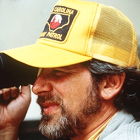 Direct radio listener’s thoughts
Direct radio listener’s thoughts
Papp agrees with advertising expert Chuck Blore, who said that commercials should be a ‘welcome intrusion’ for people. “Isn’t that just amazing? When you write radio ads and trails, you are the director of people’s thoughts. You have the power to lead them anywhere you want.” She then presents 7 diamond rules for effective radio spots that deliver results. Why? Because they connect on the emotional level.
1. Be human
“Say it, own it, read it.” When directing voice actors, Lenja Papp reminds them to be personal. She often lets them memorize the script, and then instructs them to look and talk directly at her when they speak into the microphone. In her experience, it’s also good to give voiceovers freedom to put some of their own words in it – just not the most important words. “I won’t let them touch verbs.”
“Listeners need to visualize
the results that they will have”
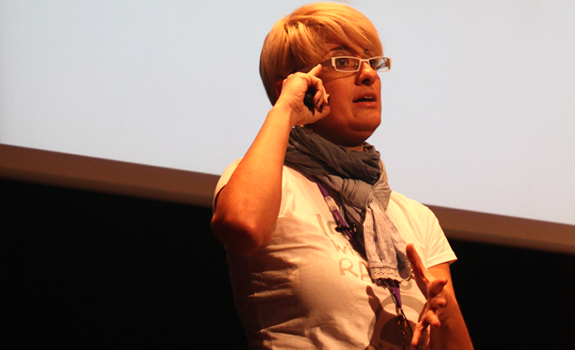
Powerful radio commercials remind listeners of more than product benefits, Lenja Papp says (photo: NEXTRADIO)
2. Paint pictures
“Listeners have to visualize what you’re saying. People will never do anything in their life that they haven’t done in their head first.” Papp elaborates that “listeners need to visualize the results that they will have when they use your product; not the benefits. They’ll put their emotion, memories and experience into your radio ad, and become more attached to it.” The following spot is a ‘theatre of the mind’ classic:
[audio:http://www.radioiloveit.com/wp-content/uploads/lenja-papp-radio-commercials-nextradio-2012-01.mp3|titles=Radio Commercial – Cat in a Dryer]
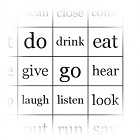 3. Use verbs
3. Use verbs
“Verbs create visualization in your brain”, she knows from analyzing many commercials. The key is to use active and present tense verbs in the second person (singular or plural). “Don’t use past tense, don’t use future tense; use present tense.” A common trick in persuasive communication, but still a very effective one, is the word ‘you’. Her advice is to use it a lot, and at the same time avoid ‘we’ or ‘our’ under any circumstance.
4. Choose one
“One ad, one message”, Lenja Papp insists. “Some people cram so much information into a radio ad, that when you throw it, people can’t catch it.” A practical technique is to let 5 people read your copy for a radio ad or trail. If not all of them know what the one message is that you want to convey, throw it away and start over. Listen for the one message in the following public service announcement:
[audio:http://www.radioiloveit.com/wp-content/uploads/lenja-papp-radio-commercials-nextradio-2012-02.mp3|titles=Public Service Announcement – Every Drop Counts]
“Life doesn’t have a soundtrack
under every situation you go through”

The use of silence to make a point is one of Lenja Papp’s diamond rules for effective radio ads (photo: Lenja Papp)
5. Shoot clichés
“Avoid clichés like the plague”, Papp quotes the late British American author and journalist Christopher Hitchens for an obvious yet important reason. “A cliché is predictable. If something is predictable, you do not have people’s attention. The only goal is to get and hold their attention.” She advises to print out your copy, highlight clichés with a text marker, and replace them by other; less predictable words.
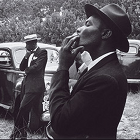 6. Change perspective
6. Change perspective
“Put a Robert Frank stamp on it.” Lenja Papp refers to the Swiss-born photographer who created a photo book named The Americans. In his work he not only captured everyday USA life, but also illustrated his talent for looking at things from a different angle than most others. She advises to use this insight for radio commercials: “When you’re writing ads, think of Robert Frank.” The first part of the following spot is a good example, the second part kills it:
[audio:http://www.radioiloveit.com/wp-content/uploads/lenja-papp-radio-commercials-nextradio-2012-03.mp3|titles=Radio Commercial – Big Yellow Self Storage]
7. Embrace silence
Use not just speech, music, and effects, but also silence. According to Papp, “they all need to work in unison, like the wheels of a car.” She doesn’t understand why it seems that there always needs to be some kind of sound: “Radio is nothing but life stories. Life doesn’t have a soundtrack under every situation you go through, does it?” In her opinion, music isn’t always necessary, unless it’s functional. “If you put in music, it doesn’t need to say the same thing [as your copy], but it does need to uplift what the words are saying.”
“Have the listener talk silently back”
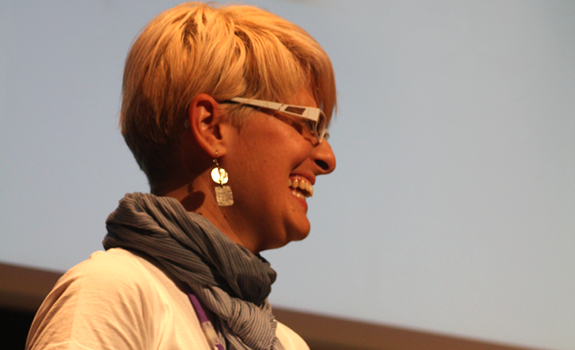
Powerful radio ads & trails let the listener answer you back in their mind, Lenja Papp explains (photo: NEXTRADIO)
Clean up your copy
Lenja Papp advises to “brutally cut from your copywriting playlist” the following things:
- The name of the brand if it wouldn’t appear there in a normal conversation
- Anything the listener already knows or can easily find out
- Statements that reflect the awareness of a competitor
- ‘Imagine’ at the beginning of a sentence
 Trigger inner audience dialogue
Trigger inner audience dialogue
She reminds that radio (commercials and promos) should always personally address and emotionally engage the audience, and cause a response. The most powerful reaction is not a physical, but a mental one. Papp: “When you communicate through a radio spot, have the listener talk silently back.” In closing, she says that “words do change lives, and you can do it every day in your radio ads and trails.” True words!
Read also:
- Production (related articles)
Stay tuned, follow us @RadioILOVEIT and click below to share this post:

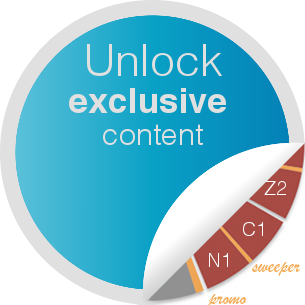



Good advice…
This would really go a long way in helping young copywriters like us.
Keep up the good work.